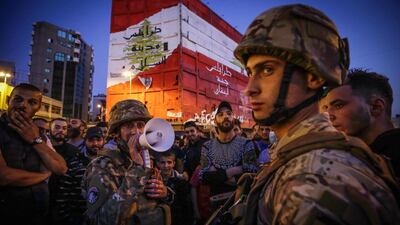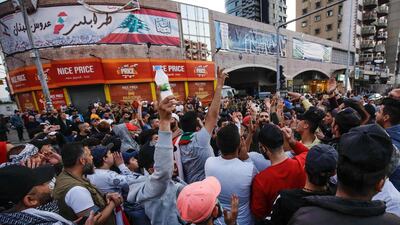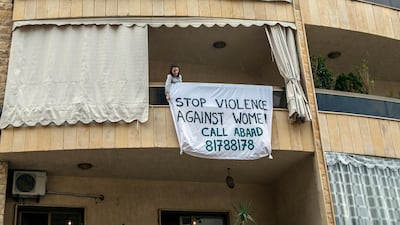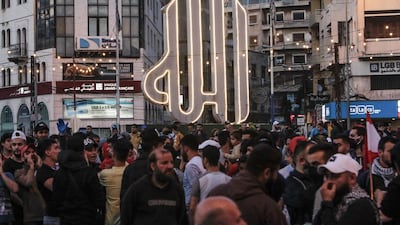In Lebanon, there has been a belief recently that the confinement due to the novel coronavirus pandemic has benefited corrupt politicians in the country. Because people have not been allowed into the streets, this view goes, the protest movement that began last October has been deflated.
There is a major problem with such a judgment. As the Lebanese economy continues to collapse, with the pound having lost more than half of its value since the protests began, the idea that people will remain passive is wholly unrealistic. Indeed, in the past two weeks protests have taken place in poorer areas of Lebanon, albeit with people wearing masks. And protests in which people remain in their cars are continuing this week.
Many Lebanese earn daily wages and the enforced confinement has meant that large numbers of people have been without any income for weeks. It has become a common refrain to hear the poor say they would prefer to die from the coronavirus than from hunger. A social explosion is inevitable unless the economic situation in the country starts showing the possibility of amelioration.
A stronger case could be made that Lebanon’s political class is far more worried by what the consequences of coronavirus are for its lock on the political and economic system than it is reassured by the resulting containment measures on a disgruntled population.
The reason is that most politicians are now trapped.
The pandemic has imposed economic burdens on societies all over the world, in the form of the opportunity costs of lost or delayed business and the heightened direct costs of dealing with the disease. In Lebanon, the situation is even more dire, which means that the Lebanese authorities now have no realistic alternative but to go to the International Monetary Fund for a bailout.
This is a step many politicians would have liked to avoid. If Lebanon is dependent on outside financial assistance, this can be leveraged in return for genuine economic reforms. That could mean the political class would have less control over Lebanon’s economy, which has served as its cash cow and instrument of patronage. Hezbollah, Lebanon's most powerful party, expressed its uneasiness many weeks ago, warning that the IMF would not be allowed to “manage” Lebanon’s financial crisis.
Today, such protests sound absurd. With Lebanon in vital need of foreign currency to import food, medicine, and fuel, there is no latitude to avoid going to the IMF, unless the political class wants to face a social backlash, with no prospect that the situation will improve in the coming years. The implications for the ability of the political elite to maintain its control could be catastrophic.
One individual who may be more vulnerable than most is the speaker of parliament, Nabih Berri. When the protests began, Mr Berri was accused by protestors in the south of embodying the worst features of the political elite, and a rest house in the city of Tyre owned by his wife was burned down. Since then, the speaker has gone overboard in portraying himself as a defender of the people.
Mr Berri, unlike his communal partner (and sometimes rival) Hezbollah, does not have the means to absorb popular discontent. His principal method of patronage was to place people in state institutions. Yet the state today is bankrupt and the salaries of most of his political clients have shrunk. Mr Berri would likely have much more trouble dealing with popular displeasure than Hezbollah.
Nor is Mr Berri alone. The reaction against the political class for having plundered the country and impoverished much of the population has spared very few leaders. They are aware of this, which is why if the situation deteriorates further, their hold on the levers of the state will slip. An IMF bailout could at least inject needed liquidity into the economy, improving matters somewhat.
Yet to say that the politicians are cornered fails to tell the whole story. With many countries in urgent need of IMF assistance due to the coronavirus, Lebanon is one among a long list requiring aid. Unless it can formulate a reform programme that can convince the fund's board, the Lebanese will be on their own. If that happens, Beirut's politicians may have to approve of serious reform measures that eat into their networks of corruption.
This is not necessarily a cause for optimism. What is likely to transpire is that each politician will try to protect his own slice of the national pie, to the detriment of the others. That means that reform will proceed chaotically. The ultimate result may be an improvement in the economy, but the absence of a consensus around a reform programme will mean that the Lebanese will suffer needlessly.
Lebanon’s protests have not ended. As dark times settle in, they may not even have truly begun. By forcing the politicians to make tough choices, the coronavirus has created a dilemma from which they may not escape. They will be squeezed by the IMF, but without it their power will erode amid burgeoning distress.
Michael Young is editor of Diwan, the blog of the Carnegie Middle East programme, in Beirut



















